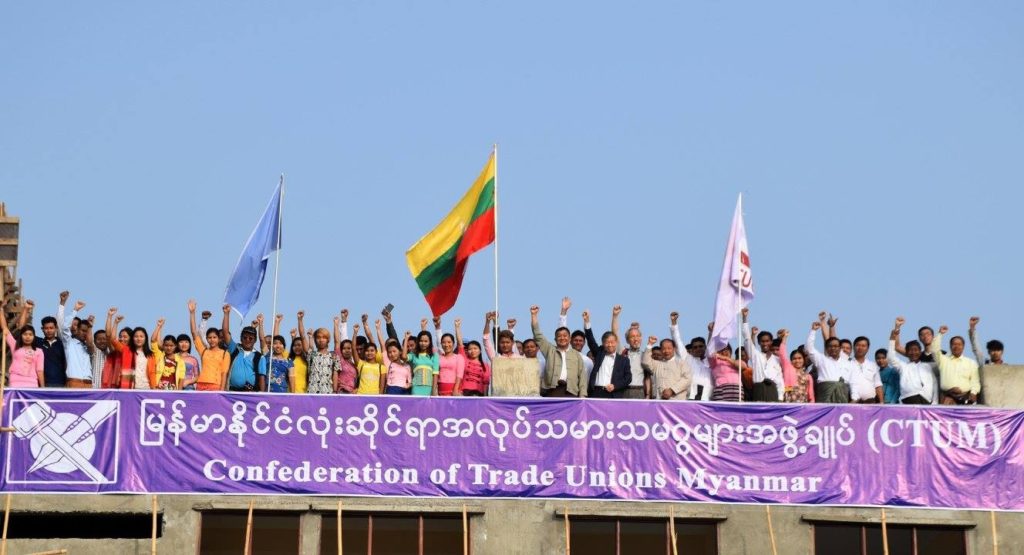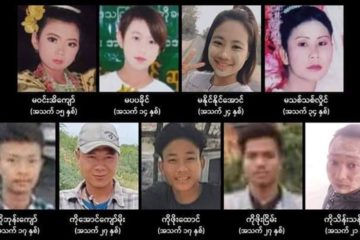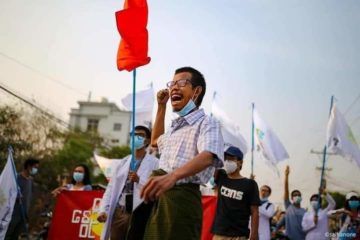
In Hlaing Thar Yar, Yangon, nearly 350 workers started striking and protesting over pay cuts below the minimum wage, and the cut of other benefits at the Gasan Apparel factory. The management, which has strong ties with the military, asked for the intervention of regime soldiers, who arrived with a truck. Fortunately no worker was arrested, but soldiers took pictures of them, and there is now an obvious fear of repercussions.
Few days earlier, Ko Thwin Aung, the president of the Gasan Apparel Garment Workers Committee, was sentenced to 3-year of imprisonment apparently under section 505(a) of the penal code, that punishes whoever “publishes or circulates any statement, rumor…” “with intent to cause, or which is likely to cause, any officer, soldier…to mutiny or otherwise disregard or fail in his duty as such”.
Trade Unions were legalized in Myanmar only in 2011, with the Labour Organisation Law, but since then union workers have constantly faced discrimination, if not worse.
Even under the NLD government, during the Coronavirus pandemic, garment factories weaponized Covid to fire thousands of unionized garment workers. Trade Union leaders faced imprisonment for leading strikes during the pandemic.
In March 2021, a few weeks after the coup, 6 workers were killed by regime soldiers in a shoe factory in Hlaing Thar Yar. The owner of the factory called the workers to collect their wages, but a dispute erupted when workers found out they were not given the full salary. That is when the owner called regime armed soldiers, who shot and killed the leader of the workers. Few minutes later, 5 more people were killed when soldiers opened fire into a crowd that was protesting over the arrest of 70 workers.
Since February 1st, dozens of union leaders have been arrested, including Daw Myo Aye of the Solidarity Trade Union of Myanmar (STUM), who was abducted in April and charged under section 505A, a new provision introduced after the coup, that punishes comments that cause “fear” or spread “fake news that incite violence against government employees”. She is currently detained in Insein prison in solitary confinement.
The Junta is clearly targeting Trade Unions, but why are they considered to be such a threat to the regime?
Unions have the ability to organize and mobilize thousands of people. It’s not a coincidence that workers were among the firsts to take it to the streets following Min Aung Hlaing’s coup. And they have the ability to hit the regime where it hurts the most: its pockets.
Comprehensive economic sanctions (CES)
In the past few months, many Burmese-based unions are calling for comprehensive economic sanctions against the military Junta. These sanctions would include any economic sector and ask foreign companies to divest and cease all operations in Myanmar, except for health and humanitarian aid. This approach is very different from adopting targeted sanctions, which only punish military-owned companies like the conglomerates MEHL and MEC, or military-controlled entities like Myanma Gem Enterprise (MGE).
Those who oppose CES, usually express concerns about their effect on the local “economy”, leading foreign investors to leave for good, local business to close and workers to lose their jobs. Moreover, they question the ability of such broad sanctions to really harm the military regime. They also point out that trade unions represent a very small percentage of workers, although the low adhesion is mainly caused by a less than perfect Labour Organisation Law, by the lack of knowledge about workers’ rights and by the fear of discrimination/repercussions.
The main goal of CES, is to undermine the regime’s ability to generate any revenue, direct or indirect (through taxations). This is an integral part of the Civil Disobedience Movement.
According to Comprehensive Sanctions Supporters, under the current regime, it’s impossible to do business ethically and working conditions are surely going to worsen if General Min Aung Hlaing stays in power. Unionists are aware of the risks of harming workers, but they see it as a sacrifice worth making to finally throw the regime down and build a new democratic Myanmar.
Since 2011 trade unions have been fighting hard to improve working conditions, which are still very poor. But since the military took over, all the little gains were suddenly lost: wages have been reduced (the minimum is 3.5 USD per day, but some are currently making around 2 USD/day, which is far from enough), workers are losing their jobs due to the coup and the Covid crisis (exacerbated by the regime’s incompetence). The military regime has no regard for human rights, let alone workers’ rights. The risk of living in slavery-like conditions in a few years is not so remote. Trade Unions are being dismantled, and workers’ voices are unlikely to be taken seriously. The generals’ political and economical incompetence is already destroying the country’s economy. Foreign investors like Toyota, Metro, Telenor, AEON, Petronas have already left or are about to leave the country.
CES are not a perfect solution, and we have to acknowledge that there is no silver bullet to defeat the military regime. CES alone won’t work, but they can be one of the many factors that will wear the regime down. The Civil Disobedience Movement, the armed resistance, boycotting military products, economic sanctions and international pressure might look ineffective if considered singularly, but one can see how powerful they can be if they are all working simultaneously.
Still, there are difficult debates to be had. When the goal is so unique, like overthrowing an authoritarian regime, the risk/benefit analysis is impossibile. No expert can quantify the value of building a democracy, or the extreme sacrifices Myanmar people are making. Sometimes sacrifices need to be made, just because it’s the right thing to do.
The moral dilemma of knowing that certain measures can harm innocent people (in this case the workers) is a real one and should not be dismissed, but it’s frustrating to see analysts and diplomats being very vocal against CES, while being absolutely silent about wages going down, trade unionists being arrested, people being evicted, existing sanctions being ignored. Also they are absolutely silent about sanctioning MOGE, which may be the the biggest contribution the international community could bring to the Myanmar Revolution. Sometimes it feels like their main goal is restoring “peace” to protect the investors, ignoring the people’s will to overthrow the regime once and for all.
Those pushing to go back to “normal”, are ignoring the fact that there has never been a “normal” for Myanmar people. Going back to 2020 is not an option. Myanmar people are not looking back, they are absolutely looking forward to a new democratic country, in which there is no place for the generals.
Trade Unions are going all-in, and the international community would better listen to their reasons.



0 Comments